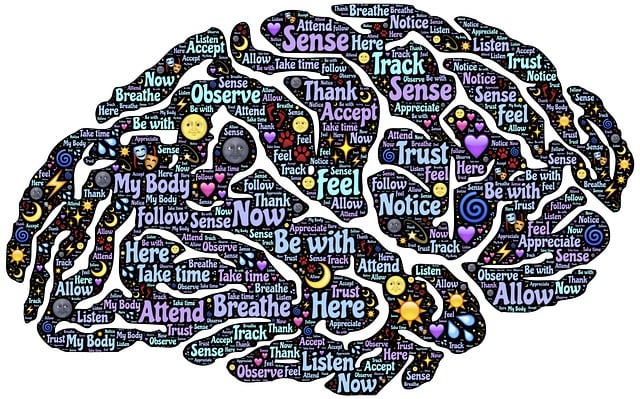Mental wellness self-assessment tools, like those provided by Englewood Suicide Prevention Therapy (ESPT), are vital for navigating today's fast-paced world. ESPT leverages these tools to prevent crises and manage underlying issues like trauma through specialized services. Their holistic approach integrates Compassion Cultivation and Positive Thinking, empowering individuals with comprehensive support that addresses emotional, psychological, and social well-being. By evaluating emotional awareness, coping strategies, and social functioning, ESPT's multi-faceted model offers tailored interventions leading to improved mental health outcomes. Using technology, like online self-reporting and mood tracking, ESPT makes assessments accessible and convenient while providing personalized recommendations for holistic well-being. Rigorous testing and continuous refinement ensure the accuracy and reliability of their self-assessment tools.
Mental wellness self-assessment tools play a pivotal role in empowering individuals to take charge of their mental health. As awareness grows about the importance of early intervention, there is a pressing need for effective and accessible assessment methods. This article explores the development of such tools, highlighting innovative approaches like the Englewood Suicide Prevention Therapy’s holistic model. We’ll delve into designing comprehensive protocols, integrating technology for digital evaluation, and the crucial processes of testing and refining to ensure accuracy and reliability.
- Understanding Mental Wellness Self-Assessment: The Need for Effective Tools
- Englewood Suicide Prevention Therapy: A Holistic Approach to Mental Health Assessment
- Designing Comprehensive Self-Assessment Protocols: Key Components
- Integrating Technology: Digital Platforms for Accessible Mental Health Evaluation
- Testing and Refining Self-Assessment Tools: Ensuring Accuracy and Reliability
Understanding Mental Wellness Self-Assessment: The Need for Effective Tools

Mental wellness self-assessment tools play a pivotal role in identifying and addressing individual mental health concerns early on. In today’s fast-paced world, where stress, anxiety, and depression are prevalent, having accessible and effective assessment methods is crucial. These tools empower individuals to take charge of their mental well-being by providing insights into their thoughts, feelings, and behaviors. By encouraging self-reflection and self-awareness, people can better understand their unique mental health landscape, enabling them to seek appropriate support or make necessary lifestyle changes.
Englewood Suicide Prevention Therapy recognizes the importance of such tools in preventing and managing mental health crises. Effective self-assessment can identify underlying issues like trauma, which often requires specialized Trauma Support Services. Moreover, these assessments can aid in pinpointing areas where Confidence Boosting strategies might be beneficial. Additionally, for individuals struggling with social interactions, Social Skills Training can be tailored from the initial self-assessment results.
Englewood Suicide Prevention Therapy: A Holistic Approach to Mental Health Assessment

Englewood Suicide Prevention Therapy offers a comprehensive and holistic approach to mental health assessment, focusing on the interconnectedness of emotional, psychological, and social well-being. This innovative therapy goes beyond traditional assessments by integrating practices like Compassion Cultivation and Positive Thinking to create a supportive environment where individuals feel heard, understood, and empowered. By fostering emotional intelligence and nurturing compassionate responses, Englewood Suicide Prevention Therapy aims to prevent suicide and promote long-lasting mental wellness.
The approach recognizes that mental health issues often stem from complex interactions between personal experiences, social factors, and physiological states. Therefore, it employs a multi-dimensional assessment process that captures not just symptoms but also underlying causes. This holistic perspective encourages individuals to explore their emotions, develop coping mechanisms, and cultivate positive thinking patterns while receiving tailored support based on their unique needs.
Designing Comprehensive Self-Assessment Protocols: Key Components

In developing comprehensive self-assessment protocols for mental wellness, it’s essential to incorporate a multi-faceted approach that captures various aspects of an individual’s psychological well-being. These tools should aim to provide a holistic evaluation, moving beyond traditional symptom checks by delving into key components such as emotional awareness, coping strategies, and social functioning. For instance, the Englewood Suicide Prevention Therapy (ESPT) model emphasizes the integration of Social Skills Training, Mood Management, and Stress Reduction Methods as foundational elements in self-assessment.
By combining these elements, professionals can gain a deeper understanding of an individual’s mental wellness landscape. This includes assessing emotional regulation skills, the effectiveness of coping mechanisms, social interactions, and overall resilience. Such a comprehensive approach ensures that interventions are tailored to address specific needs, fostering more effective and personalized support for improved mental health outcomes.
Integrating Technology: Digital Platforms for Accessible Mental Health Evaluation

In today’s digital era, integrating technology into mental wellness self-assessment tools has opened up new avenues for accessible and convenient mental health evaluations. Online platforms, such as those developed by Englewood Suicide Prevention Therapy, offer a range of interactive features that cater to diverse user needs. These digital tools often include self-reporting questionnaires, mood tracking apps, and virtual coaching sessions, making it easier for individuals to monitor their mental health from the comfort of their homes. By leveraging technology, these platforms aim to reduce the stigma associated with seeking mental health support and encourage more people to take proactive measures for their well-being.
Moreover, digital platforms incorporate Empathy Building Strategies, Resilience Building, and Confidence Boosting techniques within their assessment processes. Through personalized feedback mechanisms and adaptive algorithms, these tools not only identify areas of concern but also provide tailored recommendations for improvement. This holistic approach ensures that users receive not just a diagnosis, but also practical strategies to enhance their mental wellness. Thus, technology serves as a powerful enabler, transforming the landscape of mental health assessment and fostering a more inclusive and supportive environment.
Testing and Refining Self-Assessment Tools: Ensuring Accuracy and Reliability

Testing and refining self-assessment tools are vital steps in ensuring their accuracy and reliability. This process involves multiple rounds of trials and feedback from diverse participants to validate the tool’s effectiveness across various demographics and mental health landscapes. At Englewood Suicide Prevention Therapy, we prioritize rigorous testing to create instruments that accurately assess emotional intelligence, a key aspect often linked to mental wellness and stigma reduction efforts.
By continually refining our self-assessment tools, we aim to integrate valuable insights from users into their design, enhancing their ability to cater to the wide range of self-care practices individuals employ for managing their mental health. This iterative approach ensures that our assessments remain relevant, sensitive, and valid, ultimately contributing to more effective support and intervention strategies.
The development of robust mental wellness self-assessment tools, as demonstrated by innovative approaches like Englewood Suicide Prevention Therapy, is pivotal in enhancing accessibility to mental health evaluations. By integrating technology and incorporating holistic assessment methods, we can create comprehensive protocols that cater to diverse needs. Through rigorous testing and refinement, these tools ensure accuracy and reliability, ultimately fostering better mental health outcomes and saving lives.














